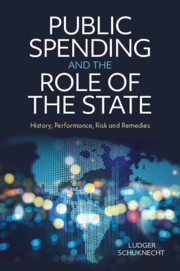Book contents
- Public Spending and the Role of the State
- Public Spending and the Role of the State
- Copyright page
- Dedication
- Contents
- Figures
- Tables
- Preface
- Acknowledgements
- Acronyms and Abbreviations
- Introduction
- Part I The Growth of Government
- Part II Value for Money
- Part III Fiscal Risks
- Part IV Remedies
- Table of Data Sources
- Bibliography
- Index
Introduction
What Should Governments Do?
Published online by Cambridge University Press: 30 October 2020
- Public Spending and the Role of the State
- Public Spending and the Role of the State
- Copyright page
- Dedication
- Contents
- Figures
- Tables
- Preface
- Acknowledgements
- Acronyms and Abbreviations
- Introduction
- Part I The Growth of Government
- Part II Value for Money
- Part III Fiscal Risks
- Part IV Remedies
- Table of Data Sources
- Bibliography
- Index
Summary
Well-functioning governments are at the basis of a modern, democratic society, the rule of law and a market process that generates trust, opportunities, prosperity and freedom. To maintain the economic success of advanced economies and the trust of our citizens, governments need to do well on their core tasks: setting sound rules of the game in the market economy and providing high-quality, essential public goods and services. These include security, education, infrastructure, basic social safety nets, the environment and sound public finances. Public expenditure is an important tool in this regard, but more spending is not correlated with more trust – ‘better’ spending and better performance on core tasks is. This chapter also sets out the map of the book: How public spending has evolved over time and how it has been financed in Part I; government performance and efficiency, the role of expenditure reforms and the ‘optimal’ size of government in Part II; the main fiscal risks in the social and financial sphere in Part III; and the case for strong rules and institutions to govern public spending and limit fiscal risks in the concluding Part IV.
Keywords
- Type
- Chapter
- Information
- Public Spending and the Role of the StateHistory, Performance, Risk and Remedies, pp. 1 - 14Publisher: Cambridge University PressPrint publication year: 2020



